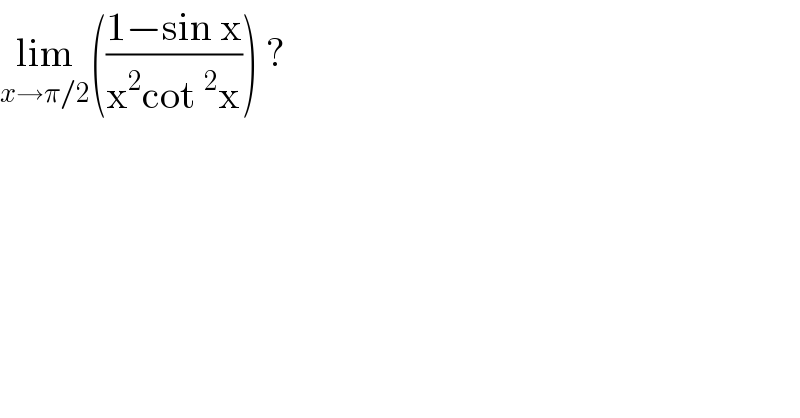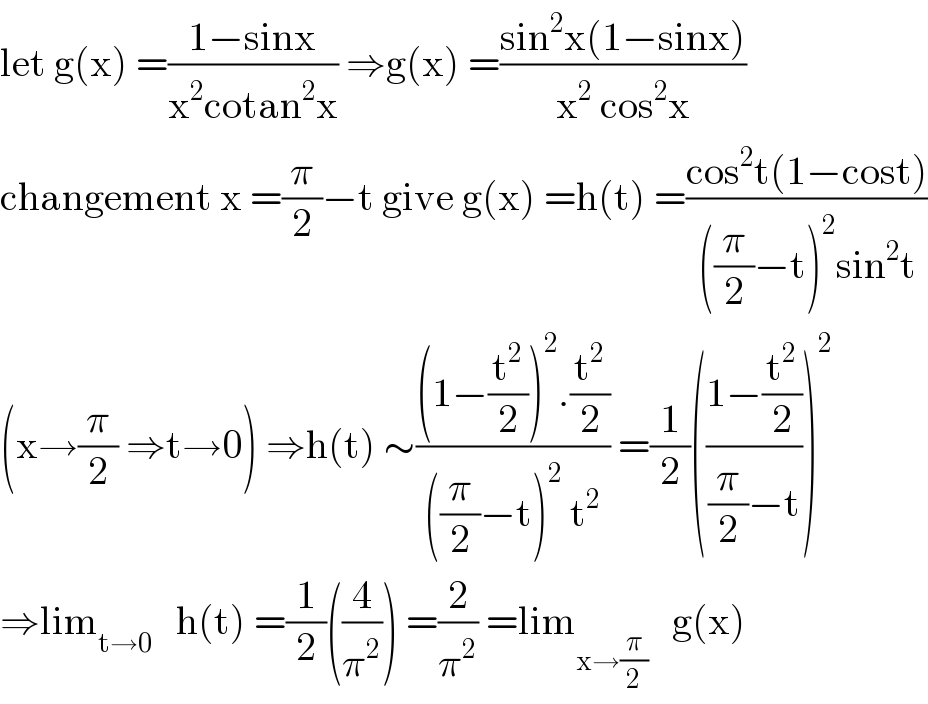
Question Number 106173 by john santu last updated on 03/Aug/20

$$\underset{{x}\rightarrow\pi/\mathrm{2}} {\mathrm{lim}}\left(\frac{\mathrm{1}−\mathrm{sin}\:\mathrm{x}}{\mathrm{x}^{\mathrm{2}} \mathrm{cot}\:^{\mathrm{2}} \mathrm{x}}\right)\:? \\ $$
Answered by bemath last updated on 03/Aug/20
![set x = (π/2)+♭ →(4/π^2 )×lim_(♭→0) ((1−sin ((π/2)+♭))/(cot^2 ((π/2)+♭)))= (4/π^2 )×lim_(♭→0) ((1−cos ♭)/(tan^2 ♭)) = (4/π^2 )×lim_(♭→0) ((2sin^2 ((♭/2)))/(tan^2 ♭)) = (8/π^2 )×[lim_(♭→0) ((sin ((♭/2)))/(tan ♭)) ]^2 = (8/π^2 )×(1/4)=(2/π^2 ) ★](Q106174.png)
$$\mathrm{set}\:\mathrm{x}\:=\:\frac{\pi}{\mathrm{2}}+\flat\:\rightarrow\frac{\mathrm{4}}{\pi^{\mathrm{2}} }×\underset{\flat\rightarrow\mathrm{0}} {\mathrm{lim}}\frac{\mathrm{1}−\mathrm{sin}\:\left(\frac{\pi}{\mathrm{2}}+\flat\right)}{\mathrm{cot}\:^{\mathrm{2}} \left(\frac{\pi}{\mathrm{2}}+\flat\right)}= \\ $$$$\frac{\mathrm{4}}{\pi^{\mathrm{2}} }×\underset{\flat\rightarrow\mathrm{0}} {\mathrm{lim}}\frac{\mathrm{1}−\mathrm{cos}\:\flat}{\mathrm{tan}\:^{\mathrm{2}} \flat}\:=\:\frac{\mathrm{4}}{\pi^{\mathrm{2}} }×\underset{\flat\rightarrow\mathrm{0}} {\mathrm{lim}}\frac{\mathrm{2sin}\:^{\mathrm{2}} \left(\frac{\flat}{\mathrm{2}}\right)}{\mathrm{tan}\:^{\mathrm{2}} \flat} \\ $$$$=\:\frac{\mathrm{8}}{\pi^{\mathrm{2}} }×\left[\underset{\flat\rightarrow\mathrm{0}} {\mathrm{lim}}\frac{\mathrm{sin}\:\left(\frac{\flat}{\mathrm{2}}\right)}{\mathrm{tan}\:\flat}\:\right]^{\mathrm{2}} \\ $$$$=\:\frac{\mathrm{8}}{\pi^{\mathrm{2}} }×\frac{\mathrm{1}}{\mathrm{4}}=\frac{\mathrm{2}}{\pi^{\mathrm{2}} }\:\bigstar \\ $$
Answered by mathmax by abdo last updated on 03/Aug/20

$$\mathrm{let}\:\mathrm{g}\left(\mathrm{x}\right)\:=\frac{\mathrm{1}−\mathrm{sinx}}{\mathrm{x}^{\mathrm{2}} \mathrm{cotan}^{\mathrm{2}} \mathrm{x}}\:\Rightarrow\mathrm{g}\left(\mathrm{x}\right)\:=\frac{\mathrm{sin}^{\mathrm{2}} \mathrm{x}\left(\mathrm{1}−\mathrm{sinx}\right)}{\mathrm{x}^{\mathrm{2}} \:\mathrm{cos}^{\mathrm{2}} \mathrm{x}} \\ $$$$\mathrm{changement}\:\mathrm{x}\:=\frac{\pi}{\mathrm{2}}−\mathrm{t}\:\mathrm{give}\:\mathrm{g}\left(\mathrm{x}\right)\:=\mathrm{h}\left(\mathrm{t}\right)\:=\frac{\mathrm{cos}^{\mathrm{2}} \mathrm{t}\left(\mathrm{1}−\mathrm{cost}\right)}{\left(\frac{\pi}{\mathrm{2}}−\mathrm{t}\right)^{\mathrm{2}} \mathrm{sin}^{\mathrm{2}} \mathrm{t}} \\ $$$$\left(\mathrm{x}\rightarrow\frac{\pi}{\mathrm{2}}\:\Rightarrow\mathrm{t}\rightarrow\mathrm{0}\right)\:\Rightarrow\mathrm{h}\left(\mathrm{t}\right)\:\sim\frac{\left(\mathrm{1}−\frac{\mathrm{t}^{\mathrm{2}} }{\mathrm{2}}\right)^{\mathrm{2}} .\frac{\mathrm{t}^{\mathrm{2}} }{\mathrm{2}}}{\left(\frac{\pi}{\mathrm{2}}−\mathrm{t}\right)^{\mathrm{2}} \:\mathrm{t}^{\mathrm{2}} }\:=\frac{\mathrm{1}}{\mathrm{2}}\left(\frac{\mathrm{1}−\frac{\mathrm{t}^{\mathrm{2}} }{\mathrm{2}}}{\frac{\pi}{\mathrm{2}}−\mathrm{t}}\right)^{\mathrm{2}} \\ $$$$\Rightarrow\mathrm{lim}_{\mathrm{t}\rightarrow\mathrm{0}} \:\:\:\mathrm{h}\left(\mathrm{t}\right)\:=\frac{\mathrm{1}}{\mathrm{2}}\left(\frac{\mathrm{4}}{\pi^{\mathrm{2}} }\right)\:=\frac{\mathrm{2}}{\pi^{\mathrm{2}} }\:=\mathrm{lim}_{\mathrm{x}\rightarrow\frac{\pi}{\mathrm{2}}} \:\:\:\mathrm{g}\left(\mathrm{x}\right) \\ $$
